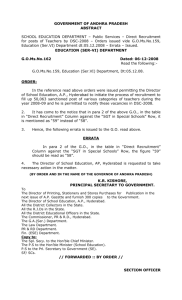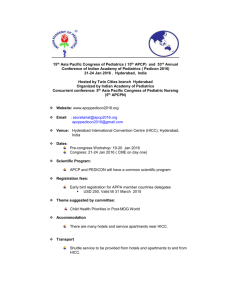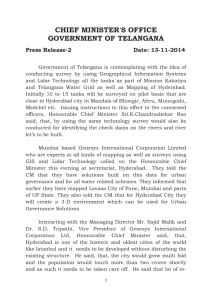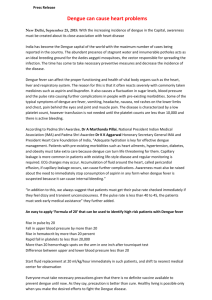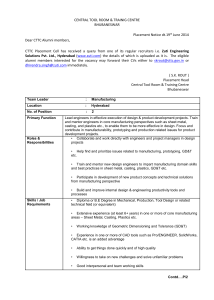Syllabus
advertisement
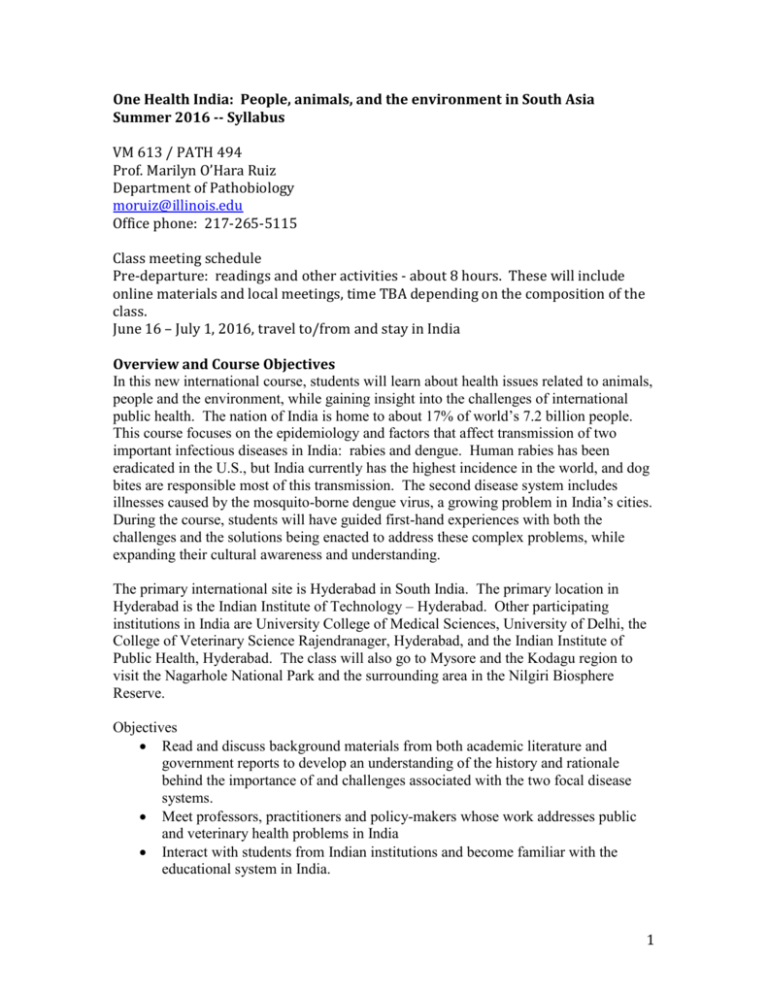
One Health India: People, animals, and the environment in South Asia Summer 2016 -- Syllabus VM 613 / PATH 494 Prof. Marilyn O’Hara Ruiz Department of Pathobiology moruiz@illinois.edu Office phone: 217-265-5115 Class meeting schedule Pre-departure: readings and other activities - about 8 hours. These will include online materials and local meetings, time TBA depending on the composition of the class. June 16 – July 1, 2016, travel to/from and stay in India Overview and Course Objectives In this new international course, students will learn about health issues related to animals, people and the environment, while gaining insight into the challenges of international public health. The nation of India is home to about 17% of world’s 7.2 billion people. This course focuses on the epidemiology and factors that affect transmission of two important infectious diseases in India: rabies and dengue. Human rabies has been eradicated in the U.S., but India currently has the highest incidence in the world, and dog bites are responsible most of this transmission. The second disease system includes illnesses caused by the mosquito-borne dengue virus, a growing problem in India’s cities. During the course, students will have guided first-hand experiences with both the challenges and the solutions being enacted to address these complex problems, while expanding their cultural awareness and understanding. The primary international site is Hyderabad in South India. The primary location in Hyderabad is the Indian Institute of Technology – Hyderabad. Other participating institutions in India are University College of Medical Sciences, University of Delhi, the College of Veterinary Science Rajendranager, Hyderabad, and the Indian Institute of Public Health, Hyderabad. The class will also go to Mysore and the Kodagu region to visit the Nagarhole National Park and the surrounding area in the Nilgiri Biosphere Reserve. Objectives Read and discuss background materials from both academic literature and government reports to develop an understanding of the history and rationale behind the importance of and challenges associated with the two focal disease systems. Meet professors, practitioners and policy-makers whose work addresses public and veterinary health problems in India Interact with students from Indian institutions and become familiar with the educational system in India. 1 Make site visits, related to dengue and mosquito control, animal welfare, conservation, and public health infrastructure. Learn to develop systems-based models using the software tool Vensim working in Indian and American student teams to use your observations and propose solutions in an interdisciplinary framework Background Readings 1) Combatting zoonoses in India http://zoonoses.phfi.org/ 2) Rabies Chapter 4: Rabies: Animal Reservoirs of an Ancient Disease. From The Role of Animals in Emerging Viral Diseases. Sudarshan, M. K., S. N. Madhusudana, B. J. Mahendra, N. S. Rao, D. H. Ashwath Narayana, S. Abdul Rahman, F. Meslin, D. Lobo, K. Ravikumar, and Gangaboraiah. 2007. Assessing the burden of human rabies in India: results of a national multi-center epidemiological survey. International journal of infectious diseases : IJID : official publication of the International Society for Infectious Diseases 11: 29-35. 3) Dengue Bhatt, S., P. W. Gething, O. J. Brady, J. P. Messina, A. W. Farlow, C. L. Moyes, J. M. Drake, J. S. Brownstein, A. G. Hoen, O. Sankoh, M. F. Myers, D. B. George, T. Jaenisch, G. R. Wint, C. P. Simmons, T. W. Scott, J. J. Farrar, and S. I. Hay. 2013. The global distribution and burden of dengue. Nature 496: 504-507. Shepard, D. S., Y. A. Halasa, B. K. Tyagi, S. V. Adhish, D. Nandan, K. S. Karthiga, V. Chellaswamy, M. Gaba, N. K. Arora, and I. S. Group. 2014. Economic and disease burden of dengue illness in India. The American journal of tropical medicine and hygiene 91: 1235-1242. 4) Interdisciplinary Systems Models Chapter 1 – Introduction from Modeling the Environment, Andrew Ford http://public.wsu.edu/~forda/AA2nd.html Introduction to Vensim software and approaches http://www.vensim.com/documentation/index.html Assignments and Grading (S/U) Student assessment will be based on: 1. Full participation in activities 2. Work with team to develop conceptual model and presentation based on ONE of the two focal areas. 3. Short paper 3-5 pages related to a specific health challenge in India. 2 Schedule In U.S. Monday, June 13 & Tuesday, June 14 (or as arranged) Background on rabies, animal control in the U.S. and India. Cultural preparation session Background on dengue and mosquito-borne pathogens. Cultural preparation session Discussion of background readings In transit Wednesday, June 15 – Friday June 17 Hyderabad, India Friday, June 17 Orientation at Indian Institute of Technology – Hyderabad (IIT-H) Saturday, June 18th Blue Cross Animal Welfare, Hyderabad, lunch out Sunday June 19th Excursion in Hyderabad Monday & Tuesday June 20th -21st Indian Institute of Public Health and College of Veterinary Science Lectures, Discussion and site visits – Topics: Public Health in India, Rabies, Dengue, mosquito control, disease surveillance Wednesday, June 22nd IIT-H One Health India – presentations Introduction to VenSim, Systems models, development of causal models. Form teams with Indian students and select one of the focal areas on which to work. Thursday, June 23rd 9 – 12 Student teams work on development of conceptual models. 1:30 - 5 Teams give status report, and work continues. Friday, June 24th 9 – 11 Student teams finalize presentations 11 – 12 Student presentations 12 – 1:30 Final lunch and Discussion 2:00 – 3:00 Orientation on Conservation issues, Environmental health Dinner out in Hyderabad with group Mysore, India Saturday, June 25th Fly to Bangalore, Bus to Mysore Afternoon / Evening open Excursions in Mysore 3 Sunday, June 26th Mysore Zoo, Conservation mission and activities. Wildlife and land conservation in India Machan Resort, Kodagu, India Monday June 27th Drive to Kodagu / Coorg region. Machan Resort Visit working organic coffee estate in the forested highlands Evening jeep safari at Nagarhole National Park Tuesday June 28th Morning jeep safari at Nagarhole National Park Hiking with local naturalist Choice of other excursions in region – rafting, hiking, birding, visit temple Wednesday June 29th Brief presentations by students on their selected individual health topic Final discussions and wrap up of lessons learned. Open time for optional excursions Final group dinner at the resort In transit Thursday June 30th Drive to Mysore, take Flybus to Bangalore airport Fly from Bangalore to Hyderabad for flight back to O’Hare Friday, July 1st Return to U.S. 4

